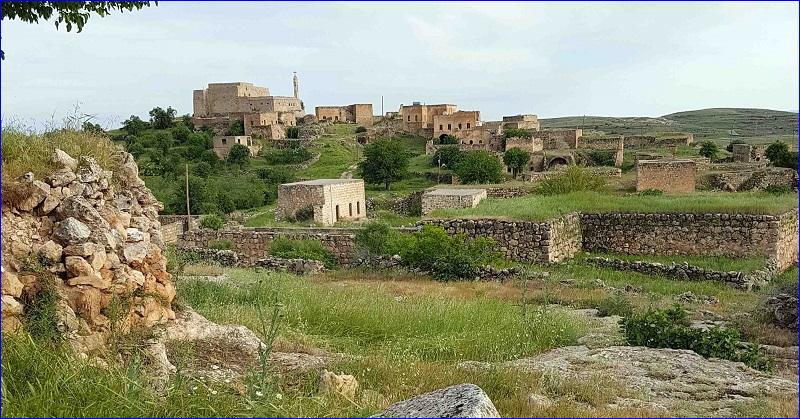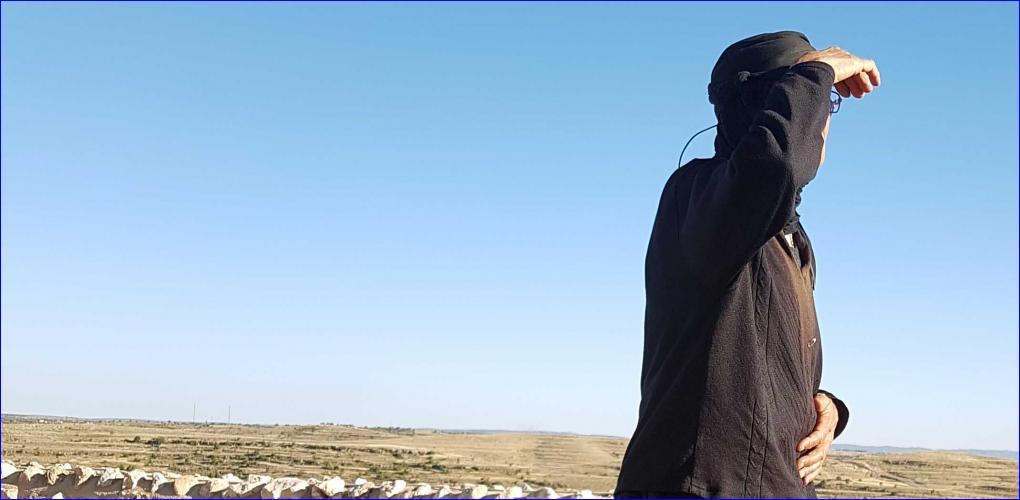


Sister Verde talked to Ahval about her first arrival at the church. "My family were removed from the village and sent out into the world. With my mother and five siblings, we moved to Sweden. I didn't really like our life in Europe and wanted to return to my homeland," she said.
"After five years abroad, I decided to return home and become a nun. I dedicated my life to the church and came here with Father Yakup in 2001. When we arrived, the villagers were using the olive and fig orchards as a toilet. Water was leaking from the pipes onto the saints' graves. Toilet water was running into the chapel," she added.
When Father Yakup died in 2014, Sister Verde remained in the church on her own, and her whole life began to change.
Over the past five years, she has faced increasing pressure from the locals to leave the church and the village. "The muhtar (village head) and his brothers attacked Father Yakup four times. One time, the muhtar's uncle blocked Father Yakup on the road near the church as he was returning home from the hospital--the Father was sick. He grabbed the Father, saying 'I will beat you to the ground,' and they beat him with sticks and fists."
Ayşe Günaysu of the Turkish Human Rights Association (İHD) has met with Sister Verde three times, and despite the reports made on the Sister's situation, nothing has changed. In fact, the threats have only increased.
"There is no life [for me]," Sister Verde explained. "My job now is writing down license plate numbers. Last week, this one car returned with two people inside. They banged on the door, shouting, 'Open the door, infidel!' I didn't open it. They went looking for the muhtar and asked for my phone number, telling him I wouldn't open the door. The muhtar turned up 15 minutes later. They called out to me and I didn't answer. They were asking, 'Is she young or old?' and the muhtar said, 'It doesn't matter--she's a nuisance.' They said, 'You're the muhtar--you can throw her out right now if you want.'"
According to Günaysu, the muhtar is one of the people behind the assaults; others just want to empty out the church to look for treasures. Other Assyrians in the area repeated this claim. Günaysu told us that some of the people doing this have been unidentified while others are working with the muhtar, a former village guard whose weapon was taken away by a judge.
During the time the Islamic State (ISIS) was gaining power in the region, other Islamic groups arrived and threatened to cut Sister Verde's head off. All of these threats increased following the death of Father Yakup.

"Just before he died," she explained, "three vehicles came and parked in front of the church. The Father couldn't get out of bed--he was too sick. Some of the men were scared of the dogs. I was watching them from the garden. The men were all speaking Turkish, Kurdish, and Arabic. They swore at me, saying 'Infidel! Why are you still here?' I answered, 'This is our land, our church.' I held a rock in my hand to protect myself."
Sister Verde went to the local prosecutor to file a complaint, and the prosecutor said the church needed cameras and other forms of protection.
"These people organised by the muhtar started ringing my phone all the time," she said. "They called 18 times in one night. Two of them came and shot my watchdogs dead. I went to the police, and they asked what sort of gun it was. 'A machine gun, a hunting rifle, how should I know?' I asked. The muhtar also came to the station and asked who had done this. 'You did it,' I said. The police told me to gather up the empty shells from the scene and come back, as if this were my job."
She said nine or ten more bearded men arrived after that. They were carrying long prayer beads and wearing shalwar pants. They went to where the dogs were and said, "Your dogs were shot--did you get new ones?" Then they shouted, "Armenians are living here! Whatever they did to us, we will do to them!" A few days later, she opened the door and there was a car sitting there with someone inside. "It was right on the doorstep. I was so afraid they were going to kidnap me, I ran back in."
Günaysu described some of the more ludicrous propaganda against the nun, including claims that she has been excommunicated and that she makes wine inside the church and brings men in there. Günaysu talked to the muhtar, who said he had no issues with the nun and was trying to help her. On the other hand, he also said offensive and sexist things about her. He said all of her claims of assault and threats are lies.
On the same day, Günaysu spoke with the police commander, who said he knew the nun very well and that he was aware of her complaints. He claimed he went to visit her regularly and that she was always glad to see him.
Unlike the muhtar and others Günaysu spoke to, the commander said, "She's a woman who is alone and in a difficult situation. She's a victim and needs help. She may also be exaggerating her fears, and we need to be understanding about this."
When Günaysu asked about security for the church, including the need for cameras on all four outside walls, the commander assured her that he would contact a company to install them.
However, one year after his promises, the cameras still yet to be installed and it has become clear that he has done nothing to stop the harassment and assaults or to ensure Sister Verde's safety. He said that the nun should call the village guard and not him when people threaten her, but Sister Verde said the village guard is part of the problem.
During Günaysu's most recent visit, she found the nun lacked some of the most basic services such as water because the truck that brings water to the village does not often come to the church, meaning Sister Verde can go for long periods without any water.
"Everything about this situation--the characteristics of the village and the remote location of the church--makes Sister Verde lonely, afraid, and under threat," Günaysu said.
"The state authorities have decided to abandon her, but they need to protect her. When synagogues were attacked in Istanbul, they were given police protection. The same thing needs to happen here," Günaysu added.

or register to post a comment.